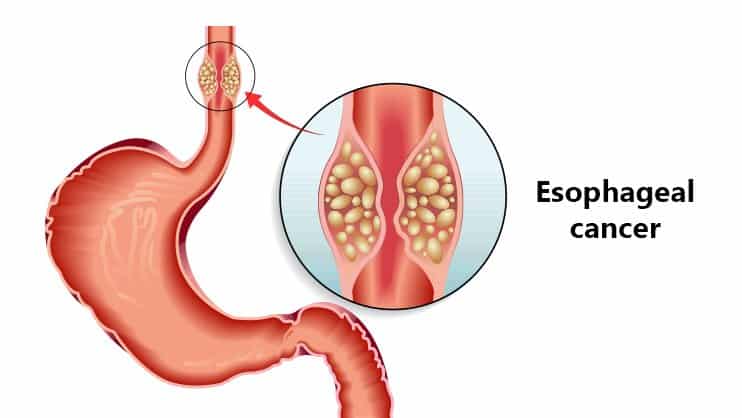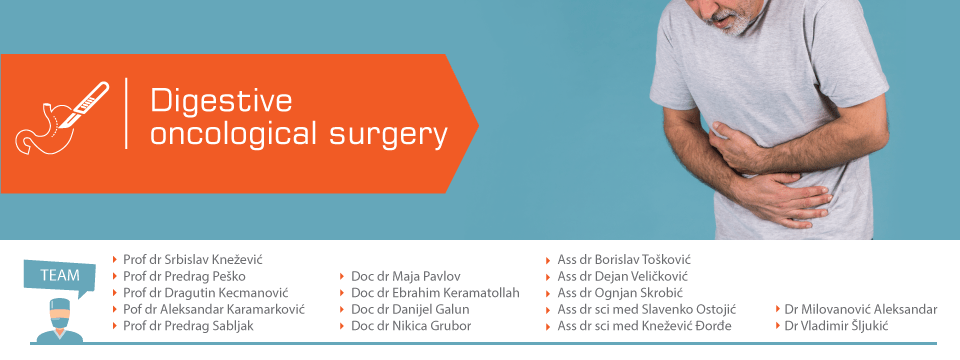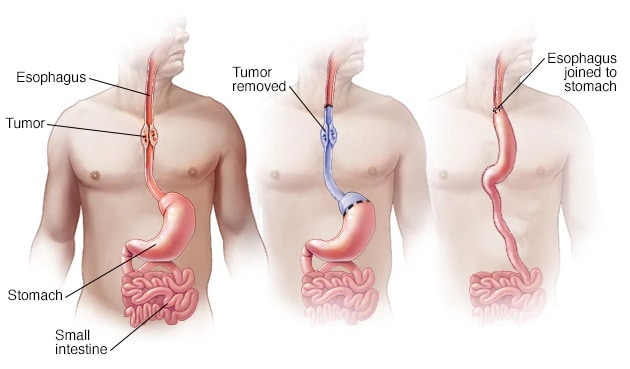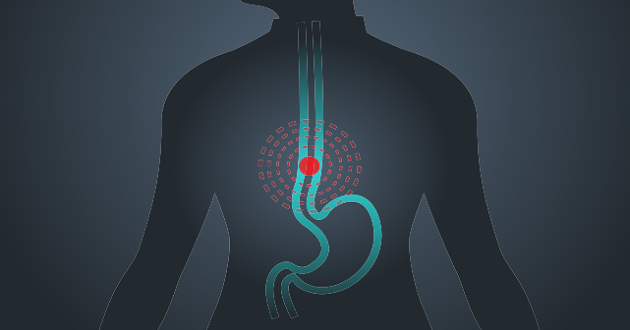What is esophageal cancer
Esophageal cancer is cancer that occurs in the esophagus — a long, hollow tube that runs from your throat to your stomach. Your esophagus helps move the food you swallow from the back of your throat to your stomach to be digested.
This cancer can occur anywhere along the esophagus. More men than women get this type of cancer.
Esophageal cancer is the sixth most common cause of cancer deaths worldwide. Incidence rates vary within different geographic locations. In some regions, higher rates of this cancer may be attributed to tobacco and alcohol use or particular nutritional habits and obesity.
Signs and symptoms of esophageal cancer include:
- Difficulty swallowing (dysphagia)
- Weight loss without trying
- Chest pain, pressure or burning
- Worsening indigestion
- Heartburn
- Coughing or hoarseness

Early esophageal cancer typically causes no signs or symptoms.
When to see a doctor
Make an appointment with your doctor if you have any persistent signs and symptoms that worry you. If you’ve been diagnosed with Barrett’s esophagus, a precancerous condition caused by chronic acid reflux (GERD –gastroesophageal reflux disease) your risk of esophageal cancer is higher. Screening for this type of cancer may be an option for people with Barrett’s esophagus.
Causes of esophageal cancer
Esophageal cancer occurs when cells in the esophagus develop changes (mutations) in their DNA. The changes make cells grow and divide out of control. The accumulating abnormal cells form a tumor in the esophagus that can grow to invade nearby structures and spread to other parts of the body.
Types of esophageal cancer
Esophageal cancer is classified according to the type of cells that are involved. The type of esophageal cancer you have helps determine your treatment options. Types of esophageal cancer include:
- Adenocarcinoma begins in the cells of mucus-secreting glands in the esophagus. Adenocarcinoma occurs most often in the lower portion of the esophagus.
- Squamous cell carcinoma.The squamous cells are flat, thin cells that line the surface of the esophagus. Squamous cell carcinoma occurs most often in the upper and middle portions of the esophagus. Squamous cell carcinoma is the most prevalent esophageal cancer worldwide.
- Other rare types.Some rare forms of esophageal cancer include small cell carcinoma, sarcoma, lymphoma, melanoma and choriocarcinoma.

Risk factors
It’s thought that chronic irritation of your esophagus may contribute to the changes that cause esophageal cancer. Factors that cause irritation in the cells of your esophagus and increase your risk of esophageal cancer include:
- Having gastroesophageal reflux disease (GERD)
- Smoking
- Having precancerous changes in the cells of the esophagus (Barrett’s esophagus)
- Being obese
- Drinking alcohol
- Having bile reflux
- Having difficulty swallowing because of an esophageal sphincter that won’t relax (achalasia)
- Not eating enough fruits and vegetables
- Undergoing radiation treatment to the chest or upper abdomen
Complications
As esophageal cancer advances, it can cause complications, such as:
- Obstruction of the esophagus. Cancer may make it difficult for food and liquid to pass through your esophagus.
- Advanced esophageal cancer can cause pain.
- Bleeding in the esophagus. This cancer can cause bleeding. Though bleeding is usually gradual, it can be sudden and severe at times.
Prevention
You can take steps to reduce your risk of esophageal cancer. For instance:
- Quit smoking. If you smoke, talk to your doctor about strategies for quitting. Medications and counseling are available to help you quit. If you don’t use tobacco, don’t start.
- Drink alcohol in moderation, if at all. If you choose to drink alcohol, do so in moderation. For healthy adults, that means up to one drink a day for women and up to two drinks a day for men.
- Eat more fruits and vegetables. Add a variety of colorful fruits and vegetables to your diet.
- Maintain a healthy weight. If you are overweight or obese, talk to your doctor about strategies to help you lose weight. Aim for a slow and steady weight loss.
Diagnosis of esophageal cancer
Tests and procedures used to diagnose esophageal cancer include:
- Barium swallow study. During this study, you swallow a liquid that includes barium and then undergo X-rays. The barium coats the inside of your esophagus, which then shows any changes to the tissue on the X-ray.
- Using a scope to examine your esophagus (endoscopy). During endoscopy, your doctor passes a flexible tube equipped with a video lens (videoendoscope) down your throat and into your esophagus. Using the endoscope, your doctor examines your esophagus, looking for cancer or areas of irritation. Your doctor may use a special scope passed down your throat into your esophagus (endoscope) to collect a sample of suspicious tissue (biopsy). The tissue sample is sent to a laboratory to look for cancer cells.
Determining the extent of the cancer
Once a diagnosis of esophageal cancer is confirmed, your doctor may recommend additional tests to determine whether your cancer has spread to your lymph nodes or to other areas of your body.
Tests may include:
- Bronchoscopy
- Endoscopic ultrasound (EUS)
- Computerized tomography (CT)
- Positron emission tomography (PET)
Your doctor uses the information from these procedures to assign a stage to your cancer. The stages of esophageal cancer are in range from 0 to IV, with the lowest stages indicating that the cancer is small and affects only the superficial layers of your esophagus.
Your doctor uses your cancer stage to select the treatments that are right for you.
Treatment
What treatments you receive for esophageal cancer are based on the type of cells involved in your cancer, your cancer’s stage, your overall health and your preferences for treatment.
Esophageal cancer surgery
Surgery to remove the cancer can be used alone or in combination with other treatments.
- Surgery to remove very small tumors.If your cancer is very small, confined to the superficial layers of your esophagus and hasn’t spread, your surgeon may recommend removing the cancer and margin of healthy tissue that surrounds it. Surgery can be done using an endoscope passed down your throat and into your esophagus.
- Surgery to remove a portion of the esophagus (esophagectomy).During esophagectomy, the surgeon removes the portion of your esophagus that contains the cancer, along with a portion of the upper part of your stomach, and nearby lymph nodes. The remaining esophagus is reconnected to your stomach. Usually this is done by pulling the stomach up to meet the remaining esophagus.
- Surgery to remove part of your esophagus and the upper portion of your stomach (esophagogastrectomy).During esophagogastrectomy, the surgeon removes part of your esophagus, nearby lymph nodes and a larger part of your stomach. The remainder of your stomach is then pulled up and reattached to your esophagus. If necessary, part of your colon is used to help join the two.
Esophageal cancer surgery carries a risk of serious complications, such as infection, bleeding and leakage from the area where the remaining esophagus is reattached to the stomach.
Surgery to remove your esophagus can be performed as an open procedure using large incisions or with special surgical tools inserted through several small incisions in your skin (laparoscopically).

Chemotherapy
Chemotherapy is drug treatment that uses chemicals to kill cancer cells. Chemotherapy drugs are typically used before (neoadjuvant) or after (adjuvant) surgery in people with esophageal cancer. Chemotherapy can also be combined with radiation therapy.
Radiation therapy
Radiation therapy uses high-energy beams, such as X-rays and protons, to kill cancer cells.
Radiation therapy is most often combined with chemotherapy in people with esophageal cancer. It’s typically used before surgery, or occasionally after surgery. Radiation therapy is also used to relieve complications of advanced esophageal cancer, such as when a tumor grows large enough to stop food from passing to your stomach.
Side effects of radiation to the esophagus include sunburn-like skin reactions, painful or difficult swallowing, and damage to nearby organs, such as the lungs and heart.
Combined chemotherapy and radiation
Combining chemotherapy and radiation therapy may enhance the effectiveness of each treatment. Combined chemotherapy and radiation may be the only treatment you receive, or combined therapy can be used before surgery.
Targeted drug therapy
Targeted drug treatments focus on specific weaknesses present within cancer cells. By blocking these weaknesses, targeted drug treatments can cause cancer cells to die. For esophageal cancer, targeted drugs are usually combined with chemotherapy.
Immunotherapy
Immunotherapy is a drug treatment that helps your immune system to fight cancer. Your body’s disease-fighting immune system might not attack cancer because the cancer cells produce proteins that make it hard for the immune system cells to recognize the cancer cells as dangerous. Immunotherapy works by interfering with that process. For esophageal cancer, immunotherapy might be used when the cancer is advanced, cancer has come back or the cancer has spread to other parts of the body.
Source: Mayo Clinic
